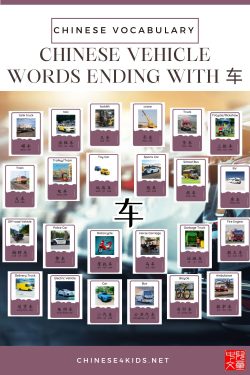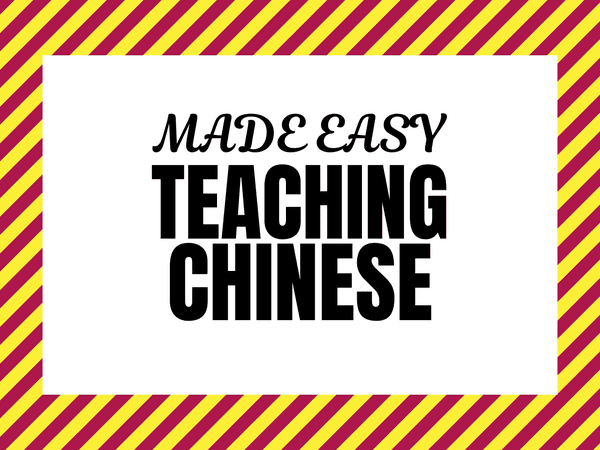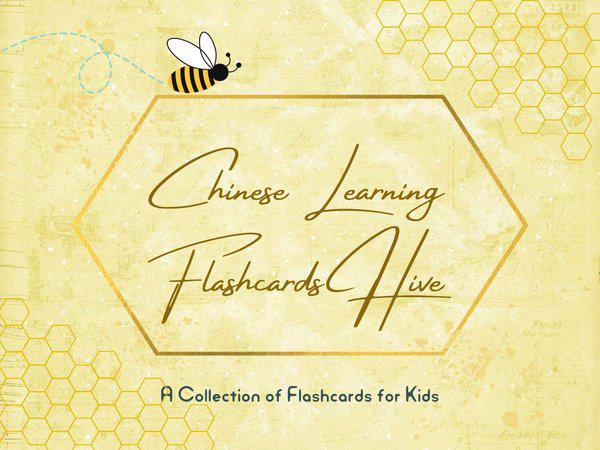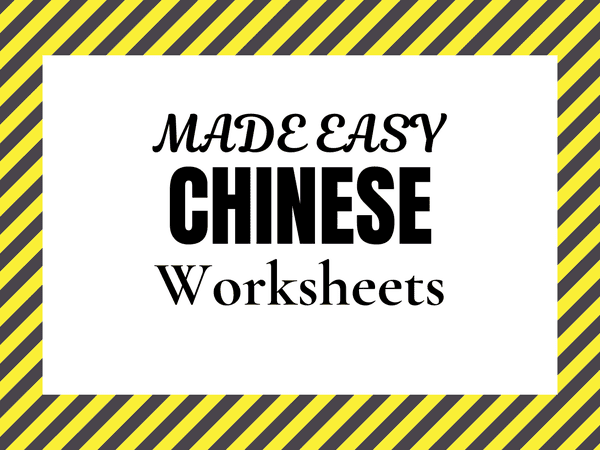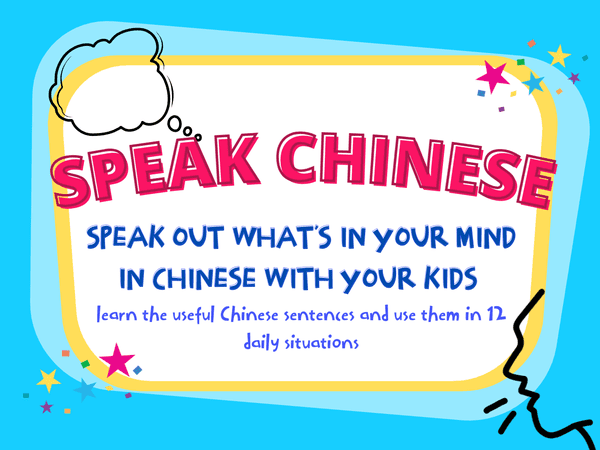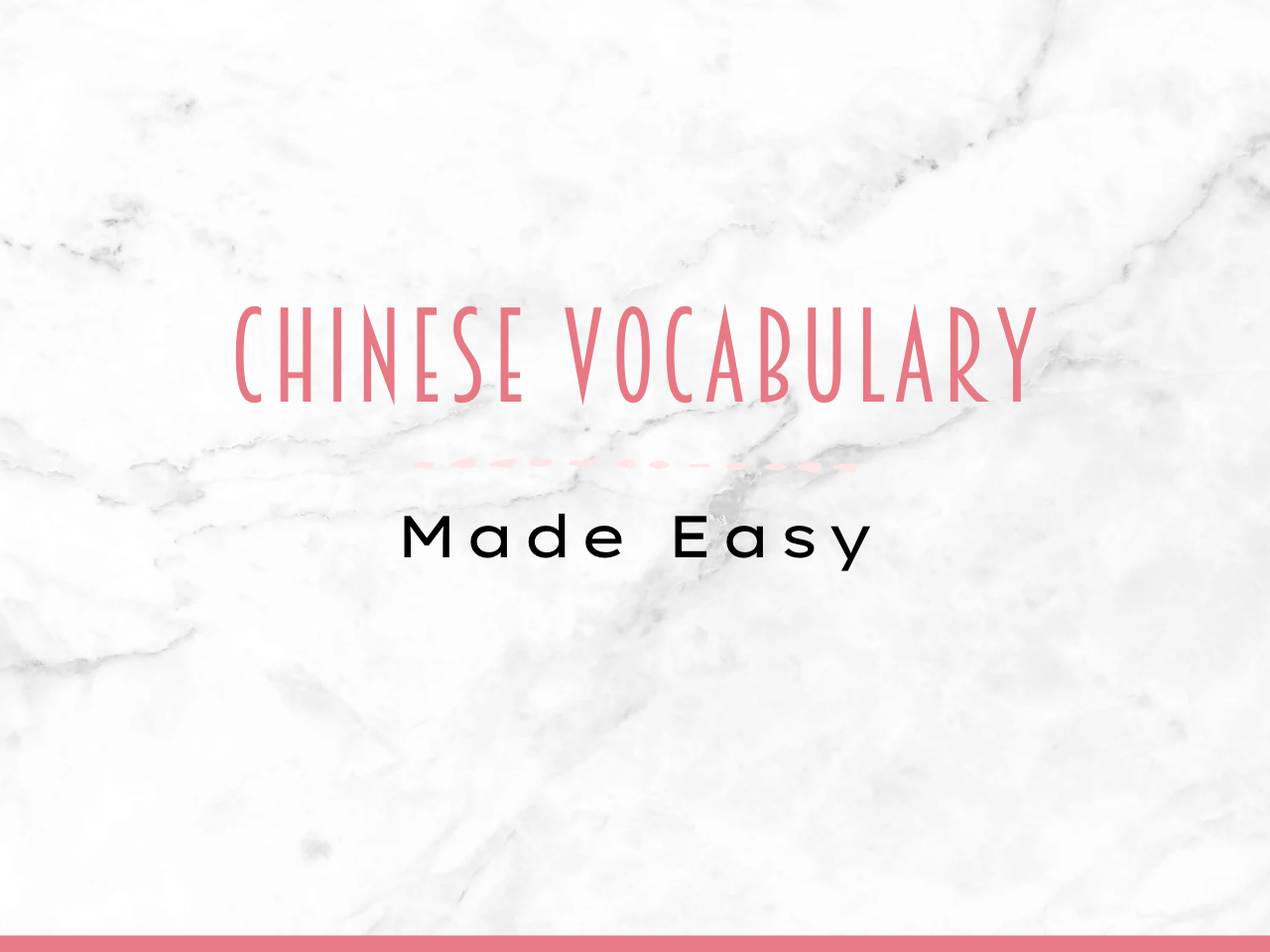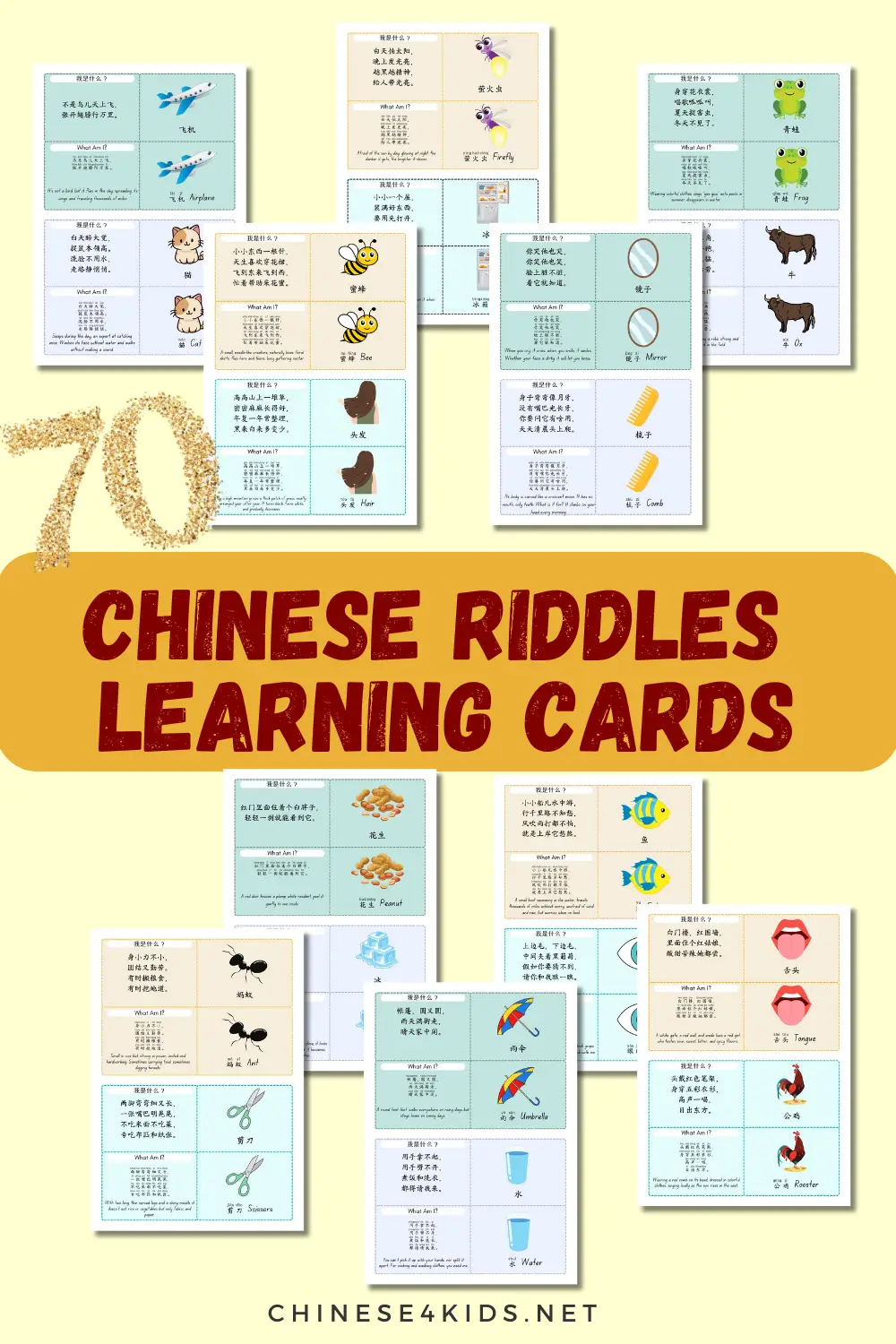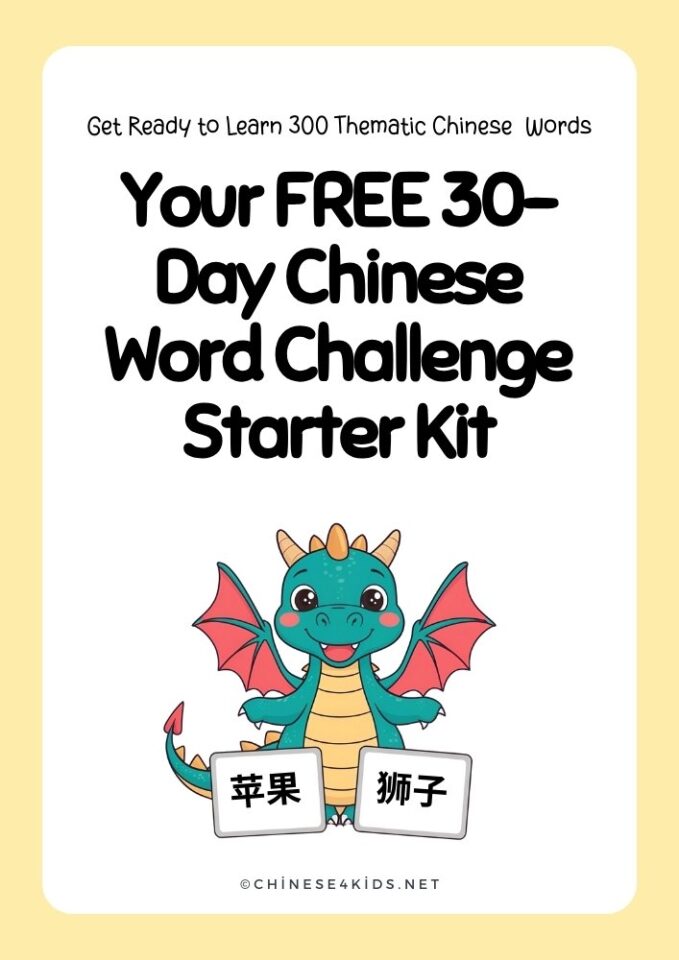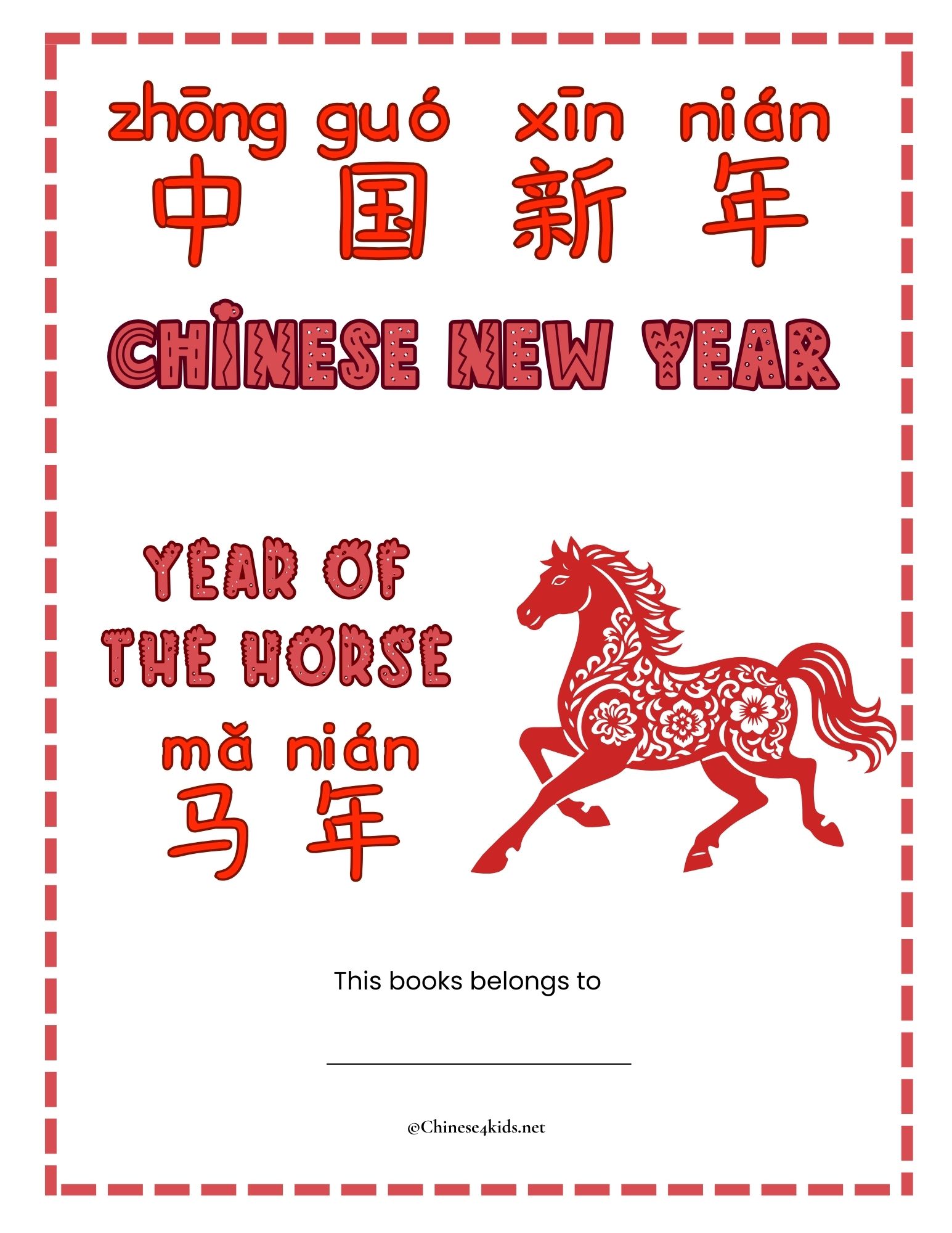
Home » Basic Chinese Vocabulary » A Guide to Chinese Vehicle Words Ending with “车”
A Guide to Chinese Vehicle Words Ending with “车”
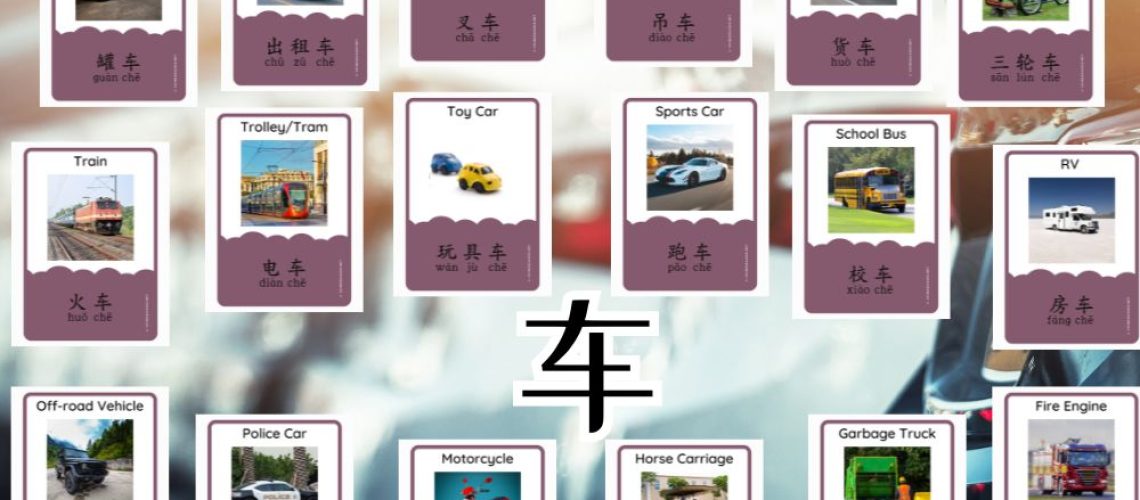
In Chinese, the word “车” (chē) refers to vehicles or means of transportation. The character appears in many common terms for vehicles, ranging from bicycles to trains. In this guide, we’ll break down some Chinese vehicle names ending in “车,” explain the structure of these words, and provide examples of each.
Structure of Vehicle Words Ending with “车”
The character “车” typically follows a descriptive word or phrase that defines the type of vehicle. This description can specify the power source, purpose, or size of the vehicle. Understanding these prefixes can give you insights into the types of vehicles and their functions.
Let’s look at the most common vehicle-related words that end with “车.”
自行车 (zìxíngchē) – Bicycle
自 (zì) – self
行 (xíng) – to move or travel
车 (chē) – vehicle
Literally it means a vehicle that moves by oneself, i.e., a bicycle.
Example:
我每天骑自行车去上班。 (Wǒ měitiān qí zìxíngchē qù shàngbān.)
I ride a bicycle to work every day.
Explanation:
“自行车” is a manually powered vehicle where the rider pedals to move forward. The term directly translates to “self-moving vehicle.”
火车 (huǒchē) – Train
火 (huǒ) – fire
车 (chē) – vehicle
Literally it means a vehicle powered by fire, i.e., a train.
Example:
我们坐火车去旅游。 (Wǒmen zuò huǒchē qù lǚyóu.)
We took a train for travel.
Explanation:
Historically, trains were steam-powered, hence the use of “火” (fire) in the term. Today, it refers to trains in general, even though modern trains are electric.
小汽车 (xiǎoqìchē) – Car
小 (xiǎo) – small
汽 (qì) – steam or gas
车 (chē) – vehicle
Meaning: A small vehicle powered by steam or gas, i.e., a car.
Example:
他买了一辆新小汽车。 (Tā mǎile yī liàng xīn xiǎoqìchē.)
He bought a new car.
Explanation:
“小汽车” is used to describe a standard passenger vehicle, or car. The term “汽” refers to the historical use of steam engines or gas combustion engines in vehicles.
货车 (huòchē) – Truck
货 (huò) – goods or cargo
车 (chē) – vehicle
Meaning: A vehicle for carrying goods, i.e., a truck.
Example:
这辆货车装满了水果。 (Zhè liàng huòchē zhuāng mǎn le shuǐguǒ.)
This truck is full of fruit.
Explanation:
“货车” is a vehicle designed for transporting cargo. It can refer to delivery trucks, lorries, or freight vehicles in general.
电动车 (diàndòngchē) – Electric Vehicle
电 (diàn) – electricity
动 (dòng) – movement
车 (chē) – vehicle
Meaning: A vehicle powered by electricity, i.e., an electric vehicle.
Example:
现在很多人喜欢骑电动车。 (Xiànzài hěn duō rén xǐhuān qí diàndòngchē.)
Nowadays, many people like to ride electric scooters.
Explanation:
“电动车” refers to electric-powered vehicles such as e-scooters or e-bikes. It’s becoming increasingly common in urban areas for short-distance transportation.
摩托车 (mótuōchē) – Motorcycle
摩托 (mótuō) – transliteration of “motor”
车 (chē) – vehicle
Meaning: A motor-powered vehicle, i.e., a motorcycle.
Example:
他每天骑摩托车去上班。 (Tā měitiān qí mótuōchē qù shàngbān.)
He rides a motorcycle to work every day.
Explanation:
“摩托车” is a direct borrowing of the word “motorcycle.” This term refers to two-wheeled motorized vehicles, combining the transliteration “mótuō” for motor and “chē” for vehicle.
马车 (mǎchē) – Horse-drawn Carriage
马 (mǎ) – horse
车 (chē) – vehicle
Meaning: A vehicle pulled by horses, i.e., a horse-drawn carriage.
Example:
古代的皇帝坐马车出行。 (Gǔdài de huángdì zuò mǎchē chūxíng.)
The emperor in ancient times traveled by horse-drawn carriage.
Explanation:
“马车” refers to a traditional vehicle pulled by horses, used in ancient times as a common means of transport before modern engines were developed.
房车 (fángchē) – RV (Recreational Vehicle)
房 (fáng) – house
车 (chē) – vehicle
Meaning A house-like vehicle, i.e., an RV or camper.
Example:
我们开房车去露营。 (Wǒmen kāi fángchē qù lùyíng.)
We are driving an RV to go camping.
Explanation:
“房车” refers to a recreational vehicle that has living space inside, essentially a mobile home. This term is commonly used for motorhomes or large campers designed for extended travel and living.
公共汽车 (gōnggòng qìchē) – Bus
公 (gōng) – public
共 (gòng) – shared or common
汽 (qì) – steam or gas
车 (chē) – vehicle
Meaning: A vehicle powered by gas or steam for public use, i.e., a bus.
Example:
我每天都坐公共汽车上班。 (Wǒ měitiān dōu zuò gōnggòng qìchē shàngbān.)
I take the bus to work every day.
Explanation:
“公共汽车” refers to public buses used for transporting people. The word “公共” means “public” or “shared,” and “汽车” refers to a gas-powered vehicle. Together, it describes a bus, an essential part of urban public transport.
校车 (xiàochē) – School Bus
校 (xiào) – school
车 (chē) – vehicle
Meaning: A vehicle designated for school transport, i.e., a school bus.
Example:
小学生每天都乘坐校车上学。 (Xiǎoxuéshēng měitiān dōu chéngzuò xiàochē shàngxué.)
Elementary school students take the school bus to school every day.
Explanation:
“校车” refers to a school bus, which is specifically used for transporting students to and from school.
救护车 (jiùhùchē) – Ambulance
救 (jiù) – rescue
护 (hù) – to protect or take care of
车 (chē) – vehicle
Meaning: A rescue and care vehicle, i.e., an ambulance.
Example:
救护车很快就到了。 (Jiùhùchē hěn kuài jiù dàole.)
The ambulance arrived quickly.
Explanation:
“救护车” is used to describe an ambulance, a vehicle designed for emergency medical services, transporting the injured or sick to hospitals.
警车 (jǐngchē) – Police Car
警 (jǐng) – police or warning
车 (chē) – vehicle
Meaning: A vehicle used by the police, i.e., a police car.
Example:
警车飞速赶到事故现场。 (Jǐngchē fēisù gǎn dào shìgù xiànchǎng.)
The police car rushed to the scene of the accident.
Explanation: “警车” refers to a police vehicle used for law enforcement duties.
送货车 (sònghuòchē) – Delivery Truck
送 (sòng) – to deliver or send
货 (huò) – goods
车 (chē) – vehicle
Meaning: A vehicle used for delivering goods, i.e., a delivery truck.
Example:
送货车在超市外卸货。 (Sònghuòchē zài chāoshì wài xiè huò.)
The delivery truck is unloading outside the supermarket.
Explanation:
“送货车” refers to trucks or vans used specifically for delivering products to stores or homes.
玩具车 (wánjùchē) – Toy Car
玩具 (wánjù) – toy
车 (chē) – vehicle
Meaning: A toy vehicle, i.e., a toy car.
Example:
孩子们正在玩他们的玩具车。 (Háizimen zhèngzài wán tāmen de wánjùchē.)
The children are playing with their toy cars.
Explanation:
“玩具车” refers to any miniature or toy vehicle that children play with. It can include small cars, trucks, or other toy vehicles.
越野车 (yuèyěchē) – Off-road Vehicle
越 (yuè) – to exceed or go beyond
野 (yě) – wild or field
车 (chē) – vehicle
Meaning: A vehicle designed to go beyond wild terrains, i.e., an off-road vehicle.
Example:
这辆越野车可以轻松穿越沙漠。 (Zhè liàng yuèyěchē kěyǐ qīngsōng chuānyuè shāmò.)
This off-road vehicle can easily traverse the desert.
Explanation:
“越野车” refers to a vehicle specifically designed for rough terrain, such as SUVs or jeeps, which are capable of driving in challenging conditions like mountains, deserts, or forests.
跑车 (pǎochē) – Sports Car
跑 (pǎo) – to run
车 (chē) – vehicle
Meaning: A vehicle designed for speed, i.e., a sports car.
Example:
他梦想拥有一辆豪华跑车。 (Tā mèngxiǎng yǒngyǒu yī liàng háohuá pǎochē.)
He dreams of owning a luxury sports car.
Explanation:
“跑车” refers to high-performance sports cars, known for their speed and sleek design.
电车 (diànchē) – Trolley/Tram
电 (diàn) – electricity
车 (chē) – vehicle
Meaning: A vehicle powered by electricity, typically referring to trolleys or trams.
Example:
上海有很多电车线路。 (Shànghǎi yǒu hěn duō diànchē xiànlù.)
Shanghai has many tram lines.
Explanation:
“电车” refers to electric-powered vehicles that often run on tracks, such as trams or trolleys in urban areas. While the word may also be used to describe electric buses in some regions, it typically refers to rail-bound electric transport in larger cities.
垃圾车 (lājīchē) – Garbage Truck
垃圾 (lājī) – garbage
车 (chē) – vehicle
Meaning: A vehicle used for collecting and transporting garbage, i.e., a garbage truck.
Example:
每周二垃圾车来收垃圾。 (Měi zhōu èr lājīchē lái shōu lājī.)
The garbage truck comes to collect trash every Tuesday.
Explanation:
“垃圾车” refers to a specialized vehicle designed for the collection, transport, and disposal of waste. It plays a crucial role in waste management systems by collecting garbage from residential, commercial, and public areas and transporting it to disposal or recycling centers. The prefix “垃圾” means “garbage” or “trash,” clearly indicating the truck’s purpose.
三轮车 (sānlúnchē) – Tricycle
三 (sān) – three
轮 (lún) – wheel
车 (chē) – vehicle
Meaning: A three-wheeled vehicle, i.e., a tricycle or rickshaw.
Example:
他们用三轮车运送货物。 (Tāmen yòng sānlúnchē yùnsòng huòwù.)
They use a tricycle to transport goods.
Explanation:
“三轮车” refers to a three-wheeled vehicle, which can range from children’s tricycles to motorized or human-powered rickshaws. It is also used for small cargo transport in many parts of Asia.
救火车 (jiùhuǒchē) – Fire Engine
救 (jiù) – to rescue
火 (huǒ) – fire
车 (chē) – vehicle
Meaning: A vehicle used for firefighting, i.e., a fire engine
Example:
救火车迅速赶到了火灾现场。 ( jiùhuǒchē xùnsù gǎndào le huǒzāi xiànchǎng.)
The fire engine quickly arrived at the fire scene.
Explanation:
“救火车” refers to a fire engine, a vehicle equipped to combat fires and carry firefighters to the scene. It contains essential equipment such as hoses, ladders, and water pumps. The word “救” means “rescue,” and “火” refers to “fire,” together forming the idea of a “firefighting vehicle.” This term directly highlights its function: rescuing people and property from fires.
Chinese Vehicle Words Ending with 车 Montessori Flashcards
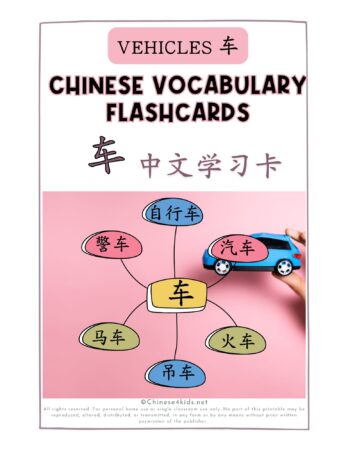
Use this set of Montessori 3-part flashcards to learn all the vehicle words in Chinese with ease and fun!
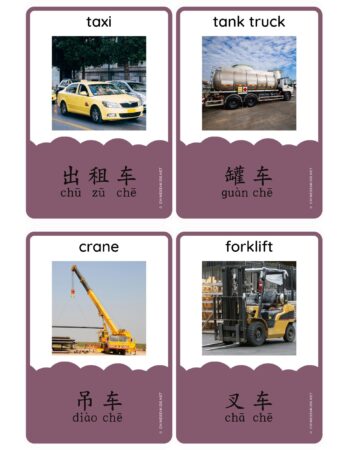
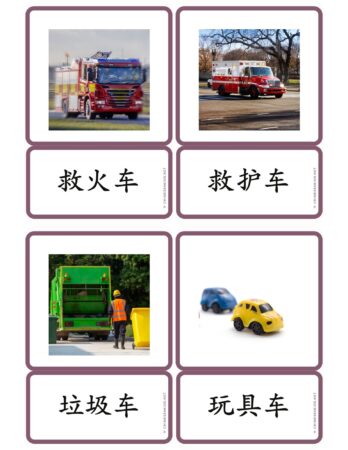
Chinese vehicle words ending in “车” often follow a logical structure that describes the vehicle’s purpose, size, or power source. From everyday transportation like 公共汽车 (bus) and 小汽车 (car) to more specialized vehicles like 越野车 (off-road vehicle) and 救护车 (ambulance), the combinations are endless. Understanding the structure of these terms not only helps in learning new vocabulary but also gives insight into the rich and descriptive nature of the Chinese language. It is also a good example of how Chinese vocabulary is composed of: characters, words, and sentences. With the common character “车”, we can come up with different words for different vehicles.
If you like this article, share it
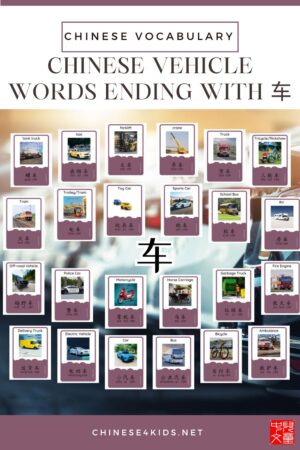
Want to learn Chinese vocabulary following a system, master 300 characters, more than 1000 words within 3 months? Chinese Vocabulary Made Easy course is right for you.
You May Also Be Interested:
- Chinese4kids Membership – a portal for busy Chinese teachers and parents
- Chinese learning flashcards Hive – a flashcards library that with regular additions of new quality Chinese learning flashcards
- Chinese learning worksheets collection – Also a part of Chinese4kids membership, this collection is for teachers and parents who want to have access to engaging worksheets and activity sheets created for kids learning Mandarin Chinese as an additional language
- Speak Chinese with Kids Course
- Chinese Vocabulary Made Easy Course
Recent Posts
Join Our Membership
Enroll to A Course
Buy An eBOOK
Our Posts
